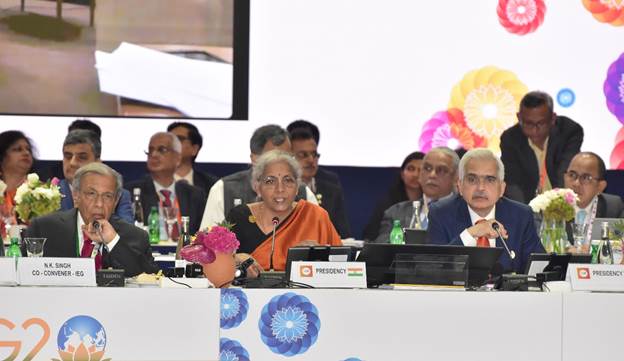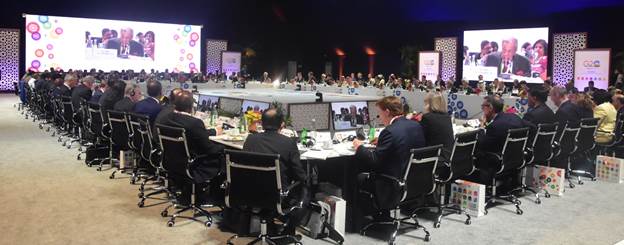| News | |||
|
Home |
|||
|
|
|||
Fourth G20 Finance Ministers and Central Bank Governors (FMCBG) Meeting on 12-13 October 2023 culminates in Marrakech, Morocco |
|||
| 14-10-2023 | |||
G20 FMCBGs adopt Communiqué at fourth and final G20 FMCBG meeting under Indian G20 Presidency Marrakech, Morocco, 13th October 2023 The G20 Finance Ministers and Central Bank Governors (FMCBG) meeting under the Indian Presidency was held during 12-13 October 2023 in Marrakech, Morocco, on the sidelines of the Annual Meetings of the International Monetary Fund (IMF) and the World Bank Group (WBG). After the previous meetings in Bengaluru, Washington DC and Gandhinagar, Gujarat, this was the fourth and final meeting of the G20 Finance Ministers and Central Bank Governors under the Indian Presidency.
Over 370 delegates, including Finance Ministers and Central Bank Governors from G20 member countries, Invitee Countries, and Heads of various International Organisations participated in the meeting. The FMCBG meeting was preceded by the Fourth G20 Finance and Central Bank Deputies (FCBD) meeting on 11 October 2023 in Marrakesh, Morocco. The results of our discussions are detailed in the official Communiqué adopted in the meeting. (CLICK HERE FOR COMMUNIQUÉ) During India’s Presidency year, the G20 Finance Track saw key achievements in several areas, including –
As guided by the G20 Leaders in September 2023, the members deliberated and developed a consensus on the remaining outcomes planned under the Indian Presidency during this meeting. The meeting was organised in two sessions covering the global economy, strengthening MDBs and crypto assets. The New Delhi Leaders’ Declaration unanimously agreed by all G20 Leaders in September was acknowledged as an important moment for multilateralism achieved through the efforts of the membership. The Indian G20 Presidency invited four African countries for the G20 Summit and had championed for Permanent Membership of African Union (AU) in the G20. Ministers and Governors recognised that the global economy has shown resilience to recent shocks. The members reiterated the need for well-calibrated monetary, fiscal, financial, and structural policies to promote growth, reduce inequalities and maintain macroeconomic and financial stability. Members discussed the priority of strengthening Multilateral Development Banks (MDBs) to address the global challenges of the 21st century and the report of the G20 Independent Expert Group (IEG). The IEG submitted Volume 2 of their Report, Volume 1 of which was submitted prior to the meeting at Gandhinagar in July 2023.
A panel discussion of eminent persons working in this area and the G20 Ministers was held prior to the G20 ministerial discussion on the subject of strengthening MDBs to deliberate on the progress made by the G20 on the agenda of strengthening MDBs and to discuss the recommendations of the IEG. This priority of the Indian G20 Presidency has generated significant interest and discussion in the global economic discourse. During the meeting, members appreciated the work of the IEG and welcomed the report. Some of the key elements that IEG recommendations have focused upon are:
FMCBGs also gave a call for further deliberations on the IEG recommendations to suggest way forward on strengthening MDBs by their meeting in April 2024. Accordingly, India will work with Brazil under its 2024 Presidency to progress towards implementation of IEG’s recommendations. As India has been voicing the concerns and the needs of the Global South, managing the global debt vulnerabilities has remained a key agenda throughout the Finance Track meetings. The G20 this year has made significant headway on the debt agenda, taking forward Prime Minister’s very pertinent observation during the G20 Leaders’ Summit in New Delhi on the need to address the debt crisis faced by vulnerable countries with sensitivity. Members deliberated on these issues and re-emphasised the importance of addressing debt vulnerabilities in low and middle-income countries. Progress was made on country cases during this year. The members appreciated the work of the G20 International Financial Architecture Working Group on the debt agenda. A new mechanism of discussion on this issue in the form of a Global Sovereign Debt Roundtable was started with the first G20 FMCBG meeting under India’s Presidency earlier this year. The second ministerial meeting of the GSDR was also held prior to the Fourth G20 FMCBG meetings and a progress report was issued by its co-chairs. Another important agenda item piloted by the Indian G20 Presidency is the advancement of Digital Public Infrastructure for advancement of financial inclusion and productivity gains. India has successfully demonstrated the success and potential of Digital Public Infrastructure (DPIs) in achieving developmental goals, bringing efficiency gains, last mile service delivery and smooth governance. The G20 members appreciated Indian Presidency’s efforts in pioneering this agenda and leaving a strong legacy in embedding the DPI concept in the G20 Financial Inclusion Agenda. Ministers and Governors welcomed the Report on SME best practices and innovative instruments to overcome common constraints in SME financing. Going forward, the G20 ministers and Governors have asked the GPFI (Global Partnership for Financial Inclusion) to continue its work for advancing financial inclusions in all three dimensions viz. access, usage, and quality, for individuals and MSMEs through innovative methods including DPI in support of inclusive growth and sustainable development. With India assuming the co-chairship of the Global Partnership for Financial Inclusion, the implementation of the Financial Inclusion Action Plan as well as policy recommendations on DPI will remain as areas that will continue to enrich the people-centric outcomes coming from G20. To achieve the goals of the Paris Agreement and Agenda 2030, we have developed recommendations for mobilizing finance for climate action and Sustainable Development Goals. In addition, we are pleased to introduce an implementation mechanism for G20 Sustainable Finance Technical Assistance Action Plan. The Technical Assistance Action Plan aims at scaling up capacity building efforts in sustainable finance, especially in EMDEs and SMEs. In the regulatory space also, the world recognises the need to prepare itself to deal with emerging technologies. The Indian Presidency has placed significant focus on policy work around crypto assets. Ministers and Governors adopted the Roadmap proposed in the IMF-FSB synthesis paper on Crypto assets to achieve common goals of macro-economic and financial stability and to ensure effective, flexible, and coordinated implementation of the comprehensive policy framework for crypto assets. The FMCBGs called for swift and coordinated implementation of this Roadmap, including implementation of policy frameworks; outreach beyond G20 jurisdictions; global coordination, cooperation and information sharing; and addressing data gaps. On issues concerning infrastructure, the FMCBGs endorsed the G20 - World Bank report on Enablers of Inclusive Cities: Enhancing Access to Services and Opportunities. The report provides an analysis on how inclusivity varies across cities globally and presents a policy compass for stakeholders to better plan, connect, and finance the delivery of urban infrastructure services. Ministers and Governors expressed their commitment to take forward the actions mandated by the G20 Leaders in the New Delhi Leaders’ Declaration. The Presidency will be passed on to Brazil at the end of one year of the Indian Presidency. The FMCBGs looked forward to continuing work on enhancing global economic cooperation to achieve strong, sustainable, balanced and inclusive growth. |
|||
 9911796707
9911796707


